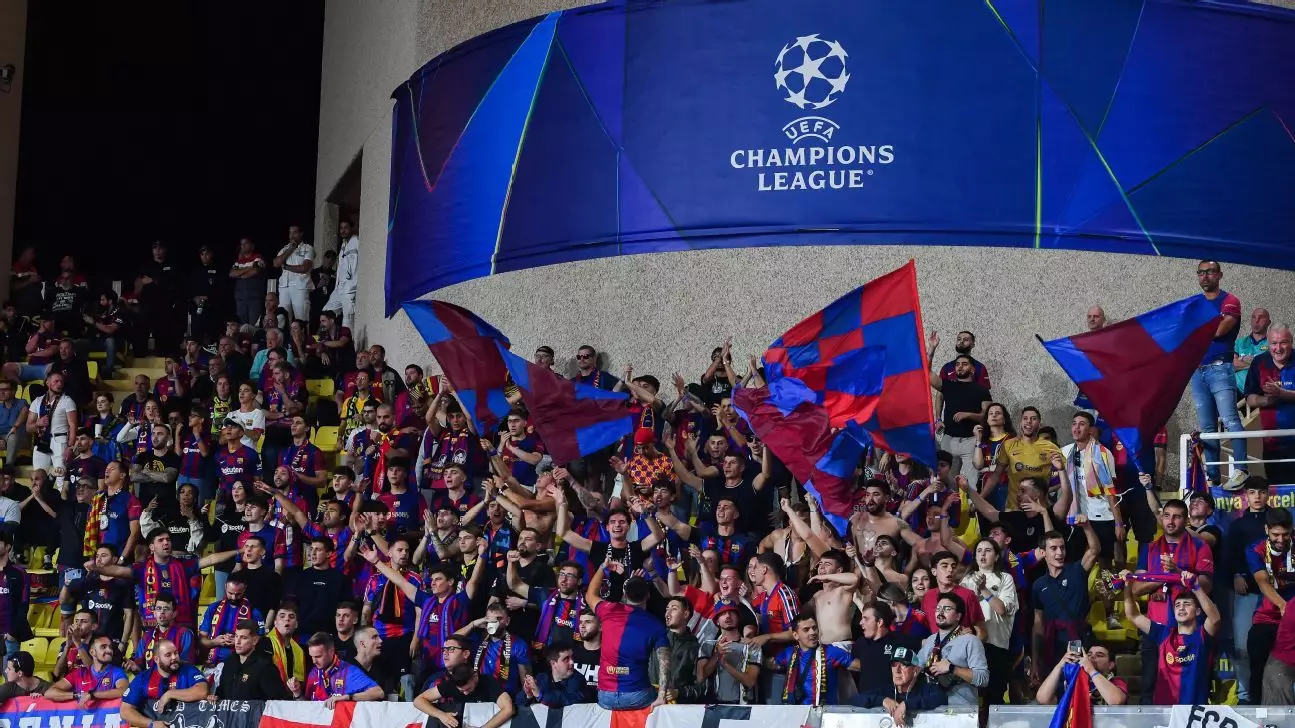In a disheartening turn of events, FC Barcelona has found itself in the eye of the storm with a recent fine from UEFA amounting to €10,000 (approximately $11,157), accompanied by a stark prohibition on fan travel for their upcoming away match in the Champions League. This punishment stems from the alarming behavior of some supporters during the club’s recent 2-1 defeat to Monaco, where Nazi imagery was prominently displayed in the stands, tarnishing the image of a club steeped in rich social values.
This disciplinary action serves as a reminder of the persistent issue of racism within football, an arena where individual actions can have far-reaching implications. UEFA’s detailed statement confirms that the charges against Barcelona relate specifically to the racist conduct of their supporters, a violation of Article 14(2) of their disciplinary regulations. While this fine may seem relatively minor in the grand scheme of football’s financial landscape, the implications for fan engagement and club reputation are substantial.
Furthermore, this isn’t Barcelona’s first dance with disciplinary issues over supporter behavior. Last April, in a Champions League match against Paris Saint-Germain, a similar episode occurred that included Nazi salutes amongst fans, resulting in a heftier fine of €25,000. The repeated nature of these incidents raises significant questions about the club’s ability to regulate its fan base and fosters a narrative that such behavior may be becoming ingrained within certain factions of supporters.
The decision to issue an additional travel ban to fans for the upcoming match against Crvena Zvezda on November 6, signifies UEFA’s zero-tolerance stance on racism and discrimination. The club will also face restrictions on selling tickets to an additional UEFA match, highlighting the governing body’s intent to reinforce accountability and encourage clubs to foster a more inclusive atmosphere among their supporters.
Barcelona’s response to these sanctions reflects a firm stance against the behavior of its supporters. Vice President Elena Fort expressed profound disappointment, condemning the actions as “disgraceful.” Her comments resonate not only as an apology but also as a call to action within the organization to combat such troubling displays that contradict the club’s core values. She emphasized the need to maintain a limit on acceptable behavior associated with love for the club, stating that the recent events are simply unacceptable.
The club also reaffirmed its commitment to human rights, vowing to uphold the principles delineated in the Universal Declaration of Human Rights. This commitment is crucial, especially as football clubs are often viewed as cultural icons wielding significant influence. The challenge, however, lies in translating such statements into concrete actions that deter future occurrences of supporter violence.
In light of these troubling incidents, Barcelona has pledged to bolster existing measures and introduce new strategies aimed at preventing such incidents in the future. This includes a crackdown on those responsible for the displays of hate and a commitment to fostering an environment where inclusivity and respect are paramount. However, the effectiveness of these measures remains contingent on the club’s execution and dedication to ongoing education and engagement efforts with the supporter base.
The remarks from head coach Hansi Flick echo the sentiments expressed by club officials, as he aligned with the statement made by Vice-President Elena Fort. His perspective underscores a shared belief that any further exploration of the topic might detract from the clear and decisive condemnation of such abhorrent behavior.
It is clear that Barcelona, a club with an unabashed legacy of promoting social justice, must work diligently to reconcile its values with the conduct of a select group of supporters. The intersection of football, culture, and community makes this task not only essential but urgent. As the sport continues to grapple with the complexities of racism and discrimination, clubs like Barcelona must take a proactive role, crafting an environment where diversity is celebrated and such unacceptable behavior finds no home.
In the grand tapestry of football, addressing issues of racism is a collective responsibility. It calls for clubs, players, and fans alike to unite against hatred, ensuring that every individual feels welcomed within football’s embrace. Only then can the beautiful game truly live up to its name, transforming into a bastion of hope, understanding, and inclusivity.

